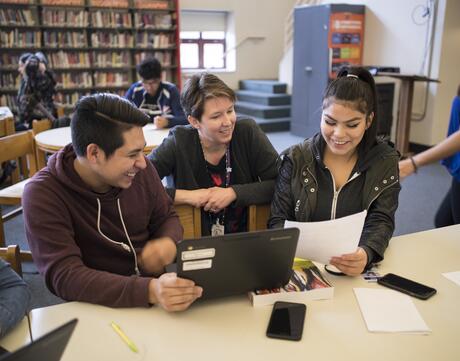What Are Essential Questions?
According to Grant Wiggins, an essential question “causes genuine and relevant inquiry into big ideas.” In the same vein, Harvard professor David Perkins describes these “big questions” as inspiring wonder and curiosity about the human condition and our world.
Essential questions invite students to grapple with complexity, deepen their understanding of a topic or theme, and explore connections between a text they are reading, themselves, and the world.
Unfortunately, classroom research shows that most of the questions that students encounter are procedural rather than exploratory.
How To Write Effective Essential Questions for ELA
Effective essential questions invite students to use their imagination and lived experiences to explore the complexities of identity, human behavior, and decision-making.
When students revisit essential questions over the course of a unit, in their journals and in conversation with others, they come to realize how questions can lead to new questions, as well as how literature can deepen their understanding of themselves and their world.
Generate a List of Essential Questions for Your Unit
With your work of literature and learning objectives in mind, identify 5-7 possible essential questions for your unit. Consider how they invite your students to wrestle with complexity and to engage the mind, heart, and conscience through exploration of the text and reflection on their own lived experiences. Take care that the essential questions reflect your unit and course goals, as well as the learning objectives you’ve identified.
Test-Drive Essential Questions
After you have settled on a few possible essential questions, take them for a test drive!
- Choose one or two possible essential questions from your list above. Reflect on how each question offers possibilities to do the following:
- Investigate characterization and key themes.
- Make personal and real-world connections to the book or text.
- Explore moral dilemmas and choices.
-
Identify 5–7 key scenes in the text that explore, complicate, or add nuance to your unit's essential question, scenes that you would like your students to explore in small groups and as a class.
-
If you can complete the following sentence starter for each scene, it’s a good sign that the essential question will work well for your text:
This scene explores, complicates, or adds nuance to my unit essential question because . . .
Essential Question Examples for a Coming-of-Age Unit
- What makes me, me? What story do I want to tell about who I am and what matters to me?
- What do I believe? What factors have shaped my beliefs as I’ve grown up?
- What individuals and experiences have shaped my beliefs about myself and the world around me?
- How can growing up and experiencing adolescence impact or change an individual’s identity?
- What does it mean to grow up? When does an adolescent become an adult?
- What does it mean to belong? How do I navigate the tension between my desire to fit in and my need to express my individuality?
Explore all Facing History’s resources for planning a coming-of-age unit.
Essential Question Examples for a Borders & Belonging Unit
- What are the visible and invisible borders that influence our sense of identity and belonging in the world?
- What are the borders that separate “us” from “them”? Who maintains these borders? Who has the power to dismantle them?
- In what ways can cultural, linguistic, racial, socio-economic, and/or ability borders influence characters’ experiences of belonging in literature? How do characters in a work of literature navigate these borders and seek belonging?
- How can we create environments where people feel a sense of belonging without having to sacrifice their values? What role can individuals play in fostering inclusivity and acceptance?
Explore all Facing History’s resources for planning a unit on borders & belonging.
Want more help planning your next unit?
This material is adapted from Facing History’s ELA unit planning guide. Access our complete unit planning guide, including activities, templates, and more to get more support with the planning process.


